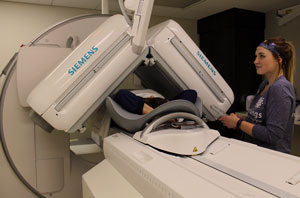Nuclear Medicine
 Nuclear medicine uses a small amount of radioactive medication to diagnose and treat disease. The medication makes the body slightly radioactive for a short time. A gamma camera tracks the movement of the medication by detecting the gamma radiation it emits.
Nuclear medicine uses a small amount of radioactive medication to diagnose and treat disease. The medication makes the body slightly radioactive for a short time. A gamma camera tracks the movement of the medication by detecting the gamma radiation it emits.
Nuclear medicine differs from X-ray and CT scans because it detects radiation emitted from the body instead of passing radiation through the body to create an image.
A nuclear medicine study helps physicians evaluate how a particular body area or organ is working. Common studies include:
Cardiac Stress Test: shows how well blood flows into the heart muscle both at rest and during physical activity to help diagnose and treat heart disease.
HIDA Scan: tracks the flow of bile from the liver to the small intestine to create a picture of the liver, gallbladder, biliary tract, and small intestine. It can help find gallstones.
Bone Scan: shows the effects of injury, disease, or infection on the bones and whether the bones have improved or further deteriorated after treatment. It can help find stress fractures or assess if cancer cells have spread from their original site to the bone.
Renal Scan: provides information on the blood supply, function, and excretion of urine from the kidneys to help assess how each of the kidneys works and at what percentage each contributes to total kidney function.
Thyroid Scan: helps determine which parts of the thyroid gland are working properly and whether the thyroid is overactive or underactive.
Parathyroid Scan: determines if parathyroid glands are hyperactive or have tumors.
Gastric Emptying Study: measures the speed with which food empties from the stomach and enters the small intestine.
Lung Ventilation/Perfusion: evaluates blood flow and airflow to the lungs to find evidence of any blood clot in the lung, called a pulmonary embolism.
Want your nuclear medicine procedure at Brookings Health? Ask your physician to refer you. Have your physician call (605) 696-8888.

